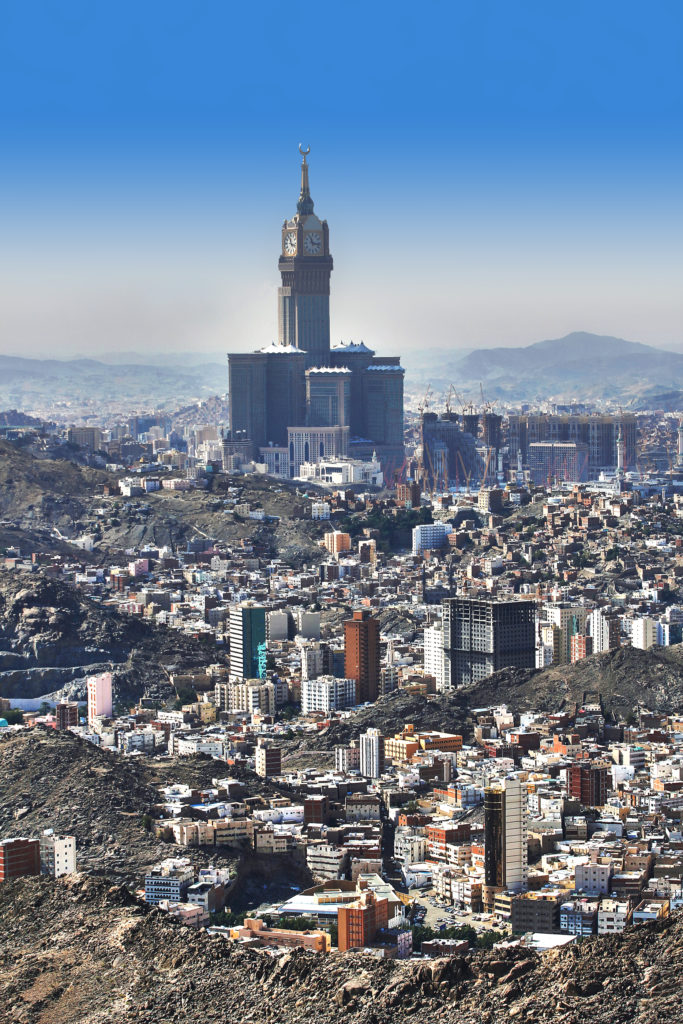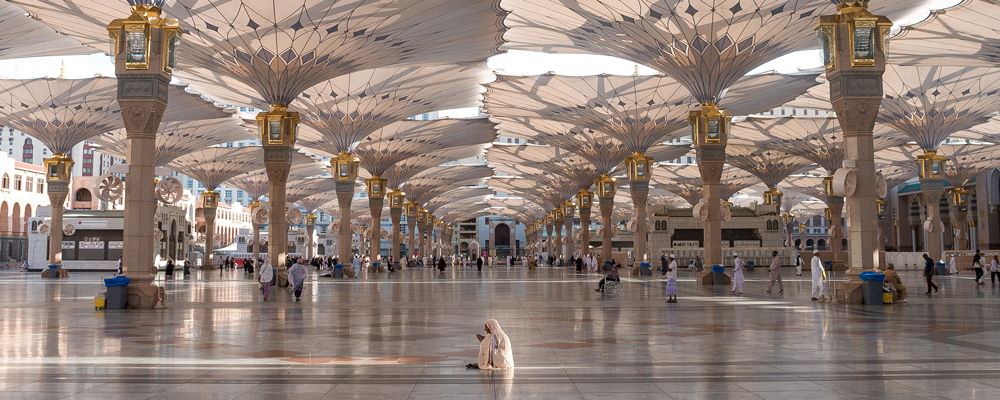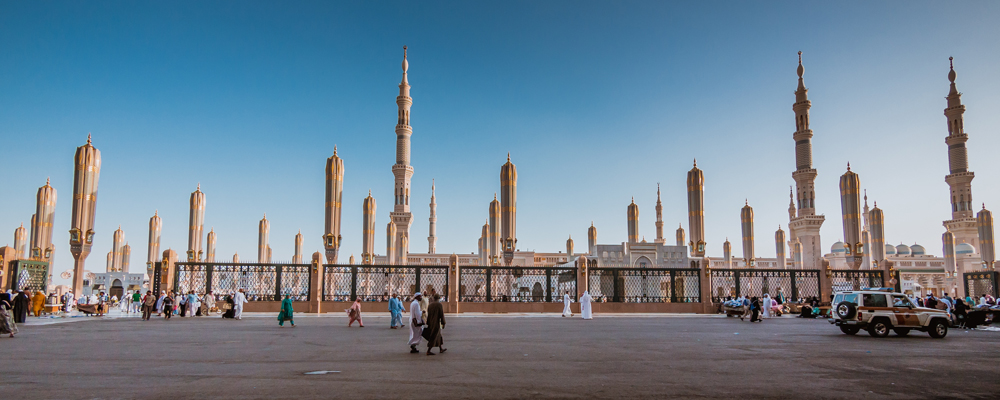In This City is a challenge to journey with us in prayer for 12 key cities in 2020. We ask you to commit to praying for fruit that will ripen and bear the seeds for mature, vibrant, and multiplying churches across the Arab world.
Introduction
Islam’s holiest city; the birthplace of Muhammad; home of the Kaaba. These are the many names of Mecca, Saudi Arabia. It is home to one of the largest and oldest mosques in the world, encompassing the most sacred shrine of Islam. It is this geographical point on earth towards which millions of Muslims turn five times every day in prayer.
But Mecca was not always as prominent as it is today. It began as an oasis on a caravan route, nestled in a valley of the Ṣirāt Mountains. It was only after Muhammad founded Islam that it became the centre of the religion and place of pilgrimage. Today, many other important Islamic sites are dotted throughout the city.
Because of its scorching, arid climate, plants and animals are scarce here. In the summer, temperatures can soar to 49 °C (120 °F); consequently, development in agriculture and other economic sectors is extremely limited. Instead, Mecca’s industries and livelihoods depend primarily on the pilgrimage industry — from complete travel packages for the ordinary pilgrim to high-rise skyscrapers overlooking the holy sites for the affluent.

About Mecca
Population: 2 million (this can triple during a typical Hajj season)
Languages: Arabic
Religion: Muslim 99%, Sunni Islam is the predominant sect of Islam in Mecca. Technically, Mecca is 100% Muslim as non-Muslims are forbidden from entering. However, there are consistent reports of seekers and believers living within the city.
Ethnic groups: The majority are Hijazi Arabs, though today Mecca has a more mixed heritage. For many years, pilgrims have stayed after Hajj and taken up residence. Significant numbers of Burmese, Bangladeshi, Indian, Pakistani, and Indonesian migrant workers, as well as those from other Arab countries, also live and work in Mecca. Percentages of ethnic groups are difficult to track due to the large number of undocumented immigrants.
Geographical size: 760 km² | 290 mi²
Location: Central, West Saudi Arabia
Key historical events:
- In AD 570, Mohammad (who was a member of the Quraysh tribe) was born in the city. Around 610, he began to have visions, which he believed were from God. It was these revelations that became the Qur’an.
- In 622, Mohammad was expelled from Mecca. Eight years later, he came back and took over the city. The Kaaba in Mecca was known as a religious pilgrimage site long before Islam. Warring tribes in the area had established a truce that allowed them to perform pilgrimages once a year. Mohammad then repurposed it as the centre of Islam.
- Mecca endured many raids and takeovers over the next centuries, from Umayyads to Abbasids to Shiites from Eastern Saudi Arabia who temporarily stole the Black Stone from the Kaaba. Egyptian Mamluks followed, but were overthrown by the Ottoman Empire when Mecca came under its control in 1517.
- After the fall of the Ottoman Empire, various Arab tribes disputed ownership of Mecca until 1925 when it was claimed by King Ibn Saud, who later established the Kingdom of Saudi Arabia.
- In 1979, militants who were unhappy with the king’s rule, staged a takeover of the Haram Mosque. It was after this event that the Kingdom embraced a much stricter and harsh enforcement of Sharia law.
- In recent years, Mecca has frequently made international news during Hajj seasons. Failures in crowd control have resulted in stampedes and the death of many pilgrims. A notorious incident took place in 1990 when 1,426 people died in a pedestrian tunnel.
Key sites:
 As Mecca is the centre point of Islam, there are some particularly important places throughout the city:
As Mecca is the centre point of Islam, there are some particularly important places throughout the city:
- The Kaaba, which is the black cube at the centre of Muslim prayers and pilgrimage. Muslims believe that Abraham and his son Ishmael built it.
- The Haram Mosque, which surrounds the Kaaba, was built to accommodate up to a million pilgrims at a time.
- The Well of Zamzam is considered sacred by Muslims, who believe its waters have powers to bless and heal.
- Jabal Al Nour, which contains the cave where Muhammad allegedly received the first of his revelations.
- Mount Arafat, just outside the city, is believed to be where Muhammad gave his last sermon.
- Mina, a small neighbourhood in the city with stone pillars, which Muslims stone during Hajj.
Hajj
The word hajj means pilgrimage, and it is one of the five pillars of Islam. Millions of Muslims come from all over the world to follow in Muhammad’s footsteps and to complete the rituals — circling the Kaaba, running between two hills, metaphorically stoning the devil, and sacrificing animals. Able Muslims are expected to perform this pilgrimage at least once in their lifetime.
Click here to learn more about the Hajj.

Challenges
People
People in Mecca tend to appear to be devout followers of Islam, but many make the most of the business the Hajj brings — from transport to selling livestock. Because of Mecca’s isolation from non-Muslim influence, people of this city need a lot of prayer. Muslims come from all over the world into Mecca. They come with an attitude of spiritual openness and with high expectations for a great spiritual experience, spiritual dreams, forgiveness of sins and ultimately a feeling of closeness to Allah.
Seekers
There are seekers in Mecca, but it is hard for them to be discipled because we don’t know of Arabic-speaking disciplers living within the city. It is difficult for believers who live in nearby towns to meet with seekers in Mecca. Religious freedom is pretty much non-existent in Saudi Arabia. Christian expatriates risk arrest or deportation if they share their faith with Muslims. Saudi nationals who have become Christian must keep their faith secret, as it is forbidden to practise a religion other than Islam openly. Leaving Islam is punishable by death.
Team
Our Saudi Arabia team know of people in Mecca who need discipleship. However, we aren’t able to connect them to locals who could meet with them and disciple them. This weighs heavily on the team. More workers are needed, preferably Arabs, who can do local follow-up and encourage new believers.
Prayer points
- Many Saudis are proud to live in the birthplace of Islam and its holiest city. Pray for this pride to be stripped away, for hearts to be opened, and lives to be transformed.
- Muslims are more spiritually open in this season as they seek closeness with God. Let’s pray that they truly meet the God who loves them as a Father and who desires to gather them under his wings. Pray that they are open to spiritual dreams and encounters with Jesus, and those who’ve had visions will pursue the truth.
- Whether during Hajj or performing Umrah — a pilgrimage that can be taken at any time of year to cleanse past committed sins — Muslims going to Mecca tend to have high expectations for their spiritual experiences. Many usually leave disappointed due to the way they are treated. Pray that disillusionment with Islam will be a tool to point them to Christ.
- Similarly, atheism is on the rise throughout Saudi Arabia. Pray that the Lord would draw to himself those who are disillusioned by religion, that seekers would surrender their lives to Jesus and be transformed from the inside out.
- Pray for good opportunities for seekers in Mecca who reach out to media organisations and want to learn more about Jesus. Pray that they are able to access the discipleship and community they need to grow in their faith and share with others. Pray also for the safety for new believers in Mecca and throughout Saudi, where following Christ can cost one’s life.
